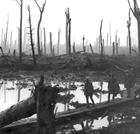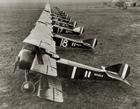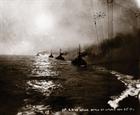Plans announced to honour sacrifices of WW1 for next year's centenary
The Government has announced its initial plans for marking the 100th anniversary of the conflict, from national acts of remembrance, to multi-million pound heritage initiatives and schemes to encourage the next generation to understand the 1914-18 conflict.
Jutland – the greatest naval battle ever waged in European waters – and the ill-fated Gallipoli campaign (where sailors fought above, on and below the waves, and on land) will be the pivotal commemorations from the Royal Navy’s viewpoint.
But before those events (in 2016 and 2015 respectively), the centennial period of remembrance begins on August 4 2014, 100 years to the day that Britain declared war on Germany.
There will be
- a service for Commonwealth leaders in Glasgow (commemorations come a day after the end of the Commonwealth Games) followed by a wreath laying at the city’s cenotaph;
- a service at St Symphorien Cemetery in Mons, where the first and last Commonwealth casualties of the war are believed to be buried;
- and Westminster Abbey will host a candle-lit vigil.
The Royal Navy lost 32,287 men in the 20th Century’s first global conflagration, plus 7,547 officers and ranks of the Royal Naval Divisions – sailors who fought alongside the Army in Flanders, on the Somme and in Gallipoli. In all, Britain lost 886,000 souls, the Empire more than 1.1m men and women.
The Grand Fleet helped to deliver the greatest naval victory in history – the surrender of the entire German Navy in November 1918, known as ‘Der Tag’ – but only after four years of bitter, grinding and, at times, hugely-disappointing combat.
The British public expected a second Trafalgar, but got Jutland – where the RN lost more ships and men, but the Germans took such a bruising that they never sortied in strength again. At the time, the clash of dreadnoughts was invariably seen as a British defeat.
As for Gallipoli, the Dardanelles campaign sought to knock Turkey out of the war but turned into a repeat of the deadlock on the Western Front. It did see some stirring deeds from the fledgling Submarine Service, however, whose boats were the scourge of the Turks in the Sea of Marmara.
Other events and initiatives announced today by Culture Secretary Maria Miller as part of the Great War centenary include national days of remembrance to mark the anniversary of the first day of the Somme – the darkest hour in the British Army’s history, July 1 1916 – and the 100th anniversary of Armistice Day on November 11 2018.
Up to £1m will be provided to cruiser HMS Caroline in Belfast – the last surviving warship of the Grand Fleet – to preserve her as a living memorial to the Great War generation so thousands of people can visit her.
Over £5m will be spent in the nation’s schools to allow two student ambassadors and a teacher from every state school to visit a WW1 battlefield and carry out research on local people who served in the conflict.
And the Heritage Lottery Fund will set aside at least £15m to help young people conserve, explore and share local WW1 history and heritage.
And £10m will be spent on a series of cultural events over the four years spanning the anniversary of the conflict.
“On August 4 1914 we entered the war – a war like no other the world had seen,” said Mrs Miller. “It is right we remember and mark the centenary of this momentous day in the world’s history, bringing its importance alive for younger generations and remembering the price that was paid by all involved.”
An advisory panel of experts, including former Chief of Defence Staff Admiral Lord Boyce, and novelists Pat Barker and Sebastian Faulks will oversee the national programme of events and educational initiatives.
An official website has been set up providing more information: www.gov.uk/ww1centenary





